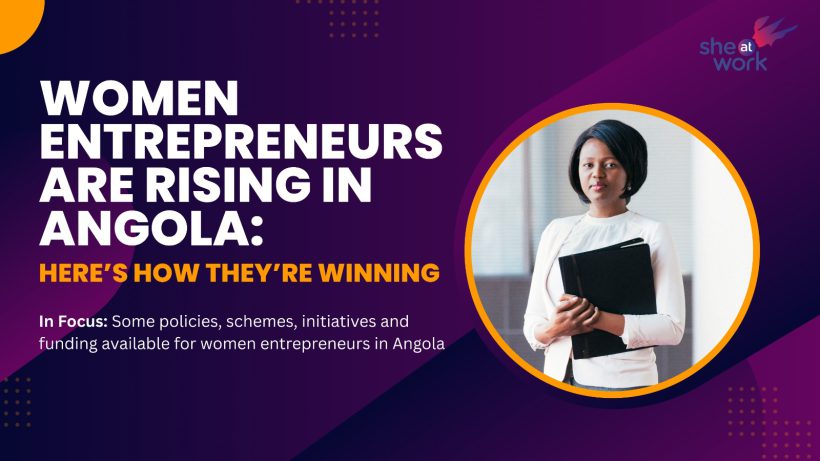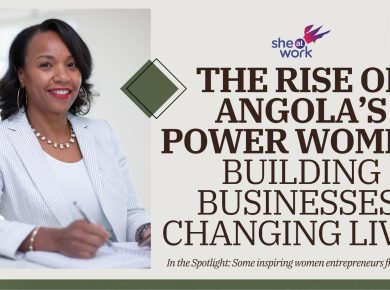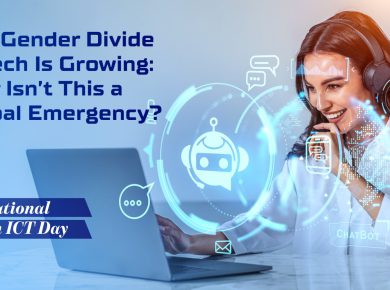In Focus: Some policies, schemes, initiatives and funding available for women entrepreneurs in Angola
WomenInBusiness #AngolaEntrepreneurs #SheLeadsAfrica #EmpowerWomen #InclusiveGrowth
Angola, often called “The Land of the Giant Sable”, is not only known for its breathtaking wildlife but also for its growing commitment to empowering women entrepreneurs. In a nation where women enjoy some of the highest legal protection in areas like business ownership, inheritance rights, and freedom of movement, the government is taking bold steps to turn opportunity into action.
Angola’s Silent Battle for Women’s Economic Freedom
Recognizing the critical role women play in the economy, Angola has launched several initiatives aimed at supporting women-led businesses and boosting their participation in the formal economy. From microcredit programs for women in the informal sector to second-chance education initiatives combating illiteracy, the landscape for women entrepreneurs is steadily evolving.
Government-backed training programs, partnerships with international organizations like UNDP and UNCTAD, and targeted funding initiatives are helping women access the skills, mentorship, and capital they need to succeed. Special emphasis is also being placed on supporting rural women, improving access to technology, education, and healthcare, and addressing gender-based violence to create safer environments for families and entrepreneurs alike.
As Angola strides forward, these resources are paving the way for a new generation of women entrepreneurs ready to transform not just their communities, but the entire nation.
Let us now look at some policies, schemes, initiatives and funding available for women entrepreneurs in Angola.
- The “Women Entrepreneurship for Africa” (WE4A)
The “Women Entrepreneurship for Africa” (WE4A) program is jointly supported by the European Union (EU), the Organization of African, Caribbean and Pacific States (OACPS) and the German Federal Ministry for Economic Cooperation and Development (BMZ) and implemented by the Tony Elumelu Foundation (TEF), and the German Development agency GIZ (E4D program).
Evidently, it is focused on empowering underserved communities in Sub-Saharan Africa comprising of women, youth, and the informal sector. The Acceleration/Growth Programme will be implemented with support of SAFEEM (Swiss Association for Entrepreneurship in Emerging Markets).
https://www.tonyelumelufoundation.org/women-entrepreneurship-for-africa
- UNDP – United Nations Development Program; FMEA-Federation of Angolan Women Entrepreneurs
UNDP – United Nations Development Program, through its Inclusive Economy Unit, with the financial support of AECID – Spanish Agency for International Development Cooperation, is working to boost the development of the private sector in Angola. Included in their main goals is – promoting economic opportunities for women, given the importance of gender in the impact on development.
FMEA-Federation of Angolan Women Entrepreneurs, is an AEP-supported initiative. FMEA is a non-profit, non-political and non-religious socio-professional institution, aimed at ensuring the representation and advocacy of Entrepreneur Women’s rights and interests in the national, regional and international decision-making bodies.
FMEA has the following institutional goals: to participate actively in the resolution of all issues pertaining to entrepreneur women within the economic sphere; to intervene at national, regional and international level in all initiatives promoting the economic and social development of entrepreneur women; to grant visibility to business-women and to the vital role they play in sustainable development; to foster and encourage business options among women; to enhance job creation through the development of small and micro enterprises; to promote vocational training by means of partnerships. Given the context of increasing economic growth, against a background of a developing private sector which still lacks the human and structural resources necessary for its development, FMEA is challenged to strengthen the strategic management capacity.
Taking into account the Government of Angola’s goals to promote economic opportunities for women as a poverty-fighting and development-promotion strategy, the AEP will support initiatives led by the Government of Angola ministries focused on gender and the economy.
https://procurement-notices.undp.org/view_file.cfm?doc_id=11505
- Orange Corners Grant Program
The Orange Corners Grant Program in Angola (part of the broader Orange Corners initiative), focuses on supporting young Angolan entrepreneurs aged 18-35 to develop and scale sustainable businesses. This includes – providing training, networking opportunities & financing to transform innovative ideas into successful ventures. A key aspect of the program is its emphasis on women entrepreneurs and businesses that align with the United Nations Sustainable Development Goals.
Key features and objectives are:
The Target Audience is – young Angolan entrepreneurs (18-35) with innovative
business ideas.
The Focus is on – supporting the development and scaling of sustainable businesses, with a particular emphasis on women entrepreneurs and businesses that contribute to the Sustainable Development Goals.
The Program Components include:
- Training and Mentorship: Providing entrepreneurs with the necessary skills and guidance to launch and grow their businesses.
- Networking: Connecting entrepreneurs with potential investors, partners, and mentors.
- Financing: Providing access to funding through the Orange Corners Innovation Fund (OCIF), including seed funding and potential follow-up investments.
- Impact – The program aims to create jobs, foster innovation, and drive economic growth in Angola.
Overall, the Orange Corners Grant Program in Angola is driven to empower young entrepreneurs, foster innovation & contribute to sustainable economic growth by providing a comprehensive ecosystem of support – including training, networking & financial resources.
ORANGE CORNERS IGNITION (OCI) is an incubation and acceleration program structured to help startups and early-stage companies grow. Its main focus is to provide rapid and effective development, increasing the chances of success and inspiring their communities. OCI offers a range of resources and support, including mentorship, access to mentors and industry experts, educational workshops and networking
opportunities.
The Orange Corners Innovation Fund or OCIF is a grant program that provides capital to fund managers to invest in early-stage startups. OCIF supports young innovative entrepreneurs in Africa, Asia and the Middle East, helping them grow their businesses and create jobs. In addition, the fund also prepares these young entrepreneurs to attract commercial investment and raise new follow-on funding.
- Some Specific Initiatives in Angola:
· Knowledge2Knowledge (K2K):
A program that strengthens higher education institutions by integrating entrepreneurship
education into curricula and facilitating partnerships between universities, the
government, and the private sector.
· African Angel Academy:
Orange Corners supports the African Angel Academy, a pan-African learning and
networking program for angel investors, to boost early-stage investment in Angola and
other African countries.
- Women Entrepreneurship in Africa (EWEA) Program
The objective of the Project – Women Entrepreneurship in Africa (EWEA) Program it – to address gender inequality and inclusive economic empowerment for African women.
Specifically, the Project aims at increasing the capacity and sustainability of enablers supporting Women-led Small and Medium Enterprises (WSMEs), as well as increase access to mentorship, funding and visibility for WSMEs.
https://msmeafricaonline.com/call-for-applications-enhancing-women-entrepreneurship-
in-africa-ewea-program/
- EMPRETEC Program
Basically, EMPRETEC is a flagship capacity-building program of UNCTAD – for the promotion of entrepreneurship, micro, small and medium sized enterprises (MSMEs) & start-ups.
Designed to ignite the spirit of innovation, it empowers businesses to drive sustainable development and inclusive growth.
EMPRETEC Program Highlights:
- Global Network: National Empretec centres support entrepreneurs, including vulnerable groups
- Governmental Links: National centres contribute to policy advice through strong governmental connections and dialogue.
- Unique Training: Delivers exclusive Entrepreneurship Training Workshops to build entrepreneurial skills.
- Proven Experience: 30+ years of promoting entrepreneurship with a global network of more than 550,000 trained entrepreneurs, known as ‘Empretecos’.
Since 2012, EMPRETEC is recognized by United Nations General Assembly resolutions – as a tool for sustainable development of entrepreneurship.
https://unctad.org/topic/enterprise-development/Empretec
- People in Need
People in Need provides immediate aid to people in need – in the event of natural disaster or wartime crisis. They also focus on long-term support for people living in poverty and unacceptable living conditions. Their development programs are underway in countries around Africa, Asia and Europe.
They are a non-governmental, non-profit organization founded on the ideals of humanism, freedom, equality & solidarity; and they consider human dignity and freedom to be fundamental values. They believe that people everywhere in the world should have the right to make decisions about their lives and to share the rights expressed in the Universal Declaration of Human Rights.
They strive for a society that is – open, informed, engaged & responsible with respect to problems at home and around the world. They want to actively participate in shaping a society where cultural, ethnic, racial and other differences are a source of enrichment rather than conflict.
They determine the specific areas and priorities of their activities with respect to the level of urgency and their actual capacity to change the situation, as they feel that it is essential that their work makes a real difference.
https://www.peopleinneed.net/who-we-are
- Development Workshop Angola
Founded in 1973, Development Workshop has been a promoter of urban and civic rights, for more than four decades. DW is an active member of the African platform of the GPR2C.
Development Workshop Angola (DW) is a non-profit organization working to improve civic rights and living conditions for the poor in less-developed communities. Its program focus areas include – shelter, peri-urban settlement upgrading, water supply and sanitation, primary health care, small enterprise development and disaster mitigation.
DW’s strategy is – to strengthen the voices and capacity of communities and organizations defend their rights to land and housing and to act on development problems and opportunities.
They have worked with international and African partners during the last 4 or 5 years, as advocates for the right to the city in many local, national and international forums. They were instrumental in getting the Angolan Government to support the inclusion of the right to the city in the New Urban Agenda.
https://www.right2city.org/organizations/development-workshop-angola/
- Swiss Association For Entrepreneurship In Emerging Markets – SAFEEM
SAFEEM is mainly into supporting entrepreneurship in emerging and frontier markets. They thrive to support and empower entrepreneurs in emerging and frontier markets through – grants, coaching, events, workshops and other initiatives in Switzerland and abroad. They connect entrepreneurs with governments, industry experts, potential partners and investors and thought-leaders in their region and internationally.
They strongly believe that entrepreneurship can bring professional success and personal fulfilment and are committed to those who want to make the world a better place through innovation.
- Seedstars Programs
The objective of the project is – to address gender inequality and inclusive economic empowerment for African women. Specifically, the project aims at increasing the capacity and sustainability of enablers supporting Women-led Small and Medium Enterprises (WSMEs), as well as increase access to mentorship, funding and visibility for WSMEs.
Founded in 2012, Seedstars has grown into a global community today, that believes in the innovative potential of emerging markets.
They aim to contribute by running the Seedstars World Competition, Seedspace hubs, various acceleration and growth programs and, at the same time, investing in high-growth companies from Latin America, Africa, Middle East, Eastern Europe, and Central and South Asia.
https://www.seedstars.com/community/entrepreneurs/programs/EWEA/
- Government’s 2023-2027 National Development Plan
Developing a national entrepreneurship strategy in Angola is high on the political agenda and aligned with the country’s 2050 strategy, focused on economic diversification and growth, among other priorities.
It’s also part of the government’s 2023-2027 National Development Plan, which includes strengthening the business environment, fostering entrepreneurship and positioning the private sector as the main driver of economic development.
To lay the building blocks of the national entrepreneurship strategy, UNCTAD has supported the country’s National Institute of Support to Micro-, Small and Medium-Sized Enterprises (INAPEM) to design a national entrepreneurship review, with an action plan.
https://unctad.org/news/angola-bets-small-businesses-help-transform-its-economy
- Angola 2050 Strategy
Angola is actively developing policies to support women entrepreneurs, focusing on economic empowerment and gender equality.
The government’s National Development Plan and the broader “Angola 2050” strategy – aims to improve access to education, reproductive health & legal protection for women. Specific initiatives include – training programs, microcredit access, and increased participation in political and decision-making roles. Moreover, the government is working to address gender disparities in education and promote equality in civic life.
This long-term development plan aims to create a conducive environment for women’s autonomy and empowerment, focusing on education, reproductive health & legal frameworks.
The “Angola 2050” strategy outlines Angola’s long-term vision for development until 2050, focusing on creating a prosperous, diversified, and sustainable nation. It envisions a society that values and strengthens human capital, develops modern infrastructure, fosters a diversified and prosperous economy, protects a resilient ecosystem, and promotes a fair, just nation with equal opportunities.
The African Development Bank Group’s 2024-2029 Country Strategy Paper (CSP) for Angola is aligned with the country’s new long-term development strategy: “Angola Vision 2050” and the National Development Plan (NDP) 2023-2027.
https://www.afdb.org/en/documents/angola-country-strategy-paper-2024-2029










